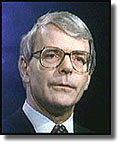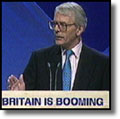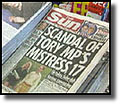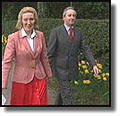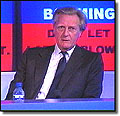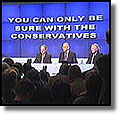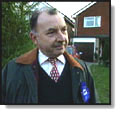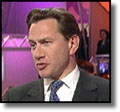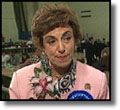
|
The Conservative Campaign
BackgroundAlmost immediately after winning his surprise general election victory in April 1992, John Major's political fortunes slumped. Holding together his 21 seat majority over the life of a Parliament was always going to be tough, especially with the Conservatives so divided over Europe, but it is a testimony to his dogged determination that the Tories were not forced to go to the country before May 1997. The 1992-97 Parliament was not an easy one for the Tories. The government was consistently rocked by scandals, resignations, by-election defeats, a long recession, defeat in the Commons over VAT on fuel, the BSE crisis, divisions over Europe, defecting MPs, a rolling leadership contest, 'sleaze' as well as the arms to Iraq affair and the Nolan Committe into standards in public life. When the then Chancellor, Norman Lamont, was forced to take Britain out of the European Exchange Mechanism in September 1992, the government began trailing Labour in the opinion polls by an alarming 20 points. It was a lead that was to remain more or less constant for the next four and a half years. By the beginning of 1997, the Government's parliamentary majority was more shaky than ever, and after Labour's victory in the Wirral South by-election Mr Major found himself at the head of a minority administration. If, as some commentators suggest, elections are not decided by the campaign itself but by the performance of the government during its time in office, then it seems safe to say John Major had little chance of victory. His government, according to the polls, was one of the most unpopular in recent history. Yet despite this, Mr Major was consistently seen by the public as more popular than the party he led. As the election approached, he and his reassuringly ordinary wife Norma were seen by Conservative party strategists as the party's greatest single assets. As the campaign gathered pace, Mr Major's image makers hoped to capitalise on his personal popularity by projecting him in a presidential light. With a long campaign ahead, which Mr Major hoped would "smoke out" Tony Blair, and a buoyant economy with low inflation and low unemployment, Mr Major still believed a Conservative victory was possible.
The Pre-election Campaign
More worrying still, the old Conservative line of reminding the electorate about the poor record of the last Labour government in 1979 and the winter of discontent no longer struck a chord with the voters, 40% of whom did not even remember the last Labour government. The Conservatives certainly had their work cut out for them.
New Labour New Danger
The adverts, which showed Tony Blair with glowing demon eyes, received a censure from the Advertising Standards Authority, which described the posters as "offensive". One former Cabinet minister said, "A party of government which can run a broadcast like that has lost all sense of decency and deserves a spell in opposition". Once the controversy over the posters had died down, Mr Major and his wife Norma embarked on a pre-election nationwide tour. The Prime Minister hoped that the definite up-swing in the economy and a long election campaign offered the Tories their best chance of success. The new campaign slogan "Life's Better With the Conservatives" attempted to tie the government to the economy in the eyes of the voters. But the much talked about 'feelgood factor' proved elusive. The voters seemed insistent in their refusal to give the government the credit for the healthy state of the economy. One key area in which the Tories maintained an undisputed advantage over Labour was the size of their election war chest. In September, they launched the biggest single mailshot by a political party in British history. Twenty-five thousand households in 104 key marginal seats received personal letters from the Prime Minister. In December, another new advertising campaign, showing people crying red tears under a Labour government, was launched costing an estimated £7 million. (A sum nearly three times higher than the total the Liberal Democrats had to spend on the whole campaign.) The Tories hoped that by starting the campaign early they would tempt Labour into bankrupting itself in an attempt to keep up. It was a ploy that failed. The decision to start early contained other problems for the Tories themselves. Keeping the public interested in politics and motivating Tory party workers, many of whom were over 60, during a long campaign was an uphill struggle.
The Campaign
The Sun came out for Mr Blair, saying the Tories were, "tired, divided and rudderless". As if this wasn't bad enough, a tidal wave of 'sleaze' overwhelmed the Conservative campaign for a full fortnight.
'Sleaze'
When the Prime Minister called the election, several Conservative MPs were still being investigated by Sir Gordon Downey, the Parliamentary Commissioner, for allegations of corruption in the cash-for-questions affair. Ex-ministers Neil Hamilton and Tim Smith both refused to stand down as Conservative candidates even when the Sunday Express frontpage headline on the 23 March screamed, "Major Wants The Sleaze MPs Out". The Prime Minister was forced into the uncomfortable position of supporting the MPs in public while privately wishing for their resignations. Mr Smith did eventually stand down but Mr Hamilton stayed on until the bitter end. Worse was to follow. Within days of the Sun'sdesertion, Piers Merchant, the Conservative MP for Beckanham, found himself splashed on the paper's front page, apparently in an adulterous liaison with a 17-year-old Soho nightclub hostess, Anna Cox.
Michael Heseltine, the Deputy Prime Minister, sternly warned Mr Merchant that he should "consider his position" - code for "resign". Yet Mr Merchant denied the allegations and stayed on with the backing of his constituency party. He eventually resigned in October 1997 after reports that he had resumed his relationship with Ms Cox. Further scandal was to befall the Conservative Party, this time in Scotland. Allan Stewart, the MP for Eastwood, resigned as a Conservative candidate due to allegations about his personal life. Mr Stewart's resignation was quickly followed by that of Sir Michael Hirst, the chairman of the Scottish Conservative Party, over what he called "past indiscretions".
You Can Only Be Sure With The Conservatives
The Conservative manifesto, entitled You Can Only Be Sure With The Conservatives, attempted to square the circle of appearing reassuring and radical at the same time. Instead it came over as confused. The Conservatives presented the voters with the mixed message that they were better off sticking with the devil they knew, while insisting that after 18 years in office they were still capable of delivering change. The manifesto spoke of a desire to make Britain, "the best place in the world to live". Its proposals included a £1.2 billion tax break to married couples were one partner stayed at home to look after children or a dependent relative, the eventual aim to lower the basic rate of income tax to 20 pence in the pound, and the privatisation of the London Underground. The Institute of Fiscal Studies costed the Conservatives' proposals at around £12 billion. When the government promised both to reduce taxes and deliver better public services, some argued that the manifesto lacked credibility.
Europe
Soon after the manifesto's launch, the issue that had always threatened to sow disunity in Conservative ranks exploded across the headlines in a spectacular fashion. Some Conservative candidates, under pressure from the Referendum Party, decided to use their personal election addresses to contradict the Government's official "wait and see" policy on a single European currency. Despite the Prime Minister's plea that his MPs should not send him, "naked into the negotiating chamber", the movement within the Conservative Party to come out publicly against a single currency gathered pace. Eventually, more than 230 Conservative candidates, supported by donations from the Euro-sceptic businessman Paul Sykes, came out against the single currency. Mr Major was forced to let Tory candidates have their way but insisted that members of the government should still toe the official line. When John Horam, a junior minister in the Department of Health, came out against the currency, Mr Major was again forced to back down and offer his party a free vote on the subject. The Prime Minister's earlier blunt dismissal of the claim that ministers would abandon the 'wait and see" policy during the campaign as "complete fantasy" appeared, in retrospect, ill-judged. The extent of the Conservative divisions in the middle of a general election campaign were unprecedented. Divided parties have, over the years, been punished by the electorate at the polls, as Labour had discovered to its cost in 1983, and the Conservatives proved no exemption in 1997. John Major's capitulation to the Euro-sceptics and his refusal to sack John Horam delighted the oppostion parties, as did the Prime Minister's failure to notify Kenneth Clarke of the change in policy and his subsequent remark that he did not have to notify "Kenneth Clarke or Joe Bloggs" of a change in policy.
The party's increasingly anti-European stance attracted criticism from some of the most senior Tory figures. Kenneth Clarke was obviously uncomfortable with the new policy and when a new Tory advertising campaign was released showing a puppet-sized Tony Blair sat on the lap of German Chancellor Helmut Kohl, it drew fire from both former Prime Minister Sir Edward Heath and ex-Foreign Secretary Sir Geoffrey Howe. When Labour made a decision towards the end of the campaign to go negative, claiming that a fifth Tory term would see the end of the National Health Service and an end to state pensions, it provoked John Major into a passsionate response. He attacked the allegations head-on, saying "If anybody in my Cabinet actually prevailed in an argument like that, I would not only leave Downing Street, I would leave politics and call a general election".
The Final Days
With just three days to go until the election, John Major rounded on Labour's constitutional reforms, telling voters that there were only "72 hours to save the union".
Mr Major believed his decision to attack Labour on the constitution had played a significant part in the Conservative election victory in 1992. He attempted to repeat the trick in 1997, embarking on a day-long tour of Northern Ireland, Scotland, Wales and England. With just one day to go, the Prime Minister launched what he called "the Battle for Britain" calling election day a "day of destiny". He attempted to rally Conservative support by laying out what he believed the British people had to lose if Labour were to be swept to power in a landslide, as the polls suggested.
"No one can honestly question that the transformation in Britain has been anything less than an economic miracle. It's too good to give up. "They would throw away our economic success by embracing the European social model, just as it is seen to be failing. They'd weaken the nation forever by a double threat to our Westminster Parliament - ceding power to devolved parliaments within Britain and handing over power to an integrationist federal Europe at the same time." After finishing his final day of campaigning, the Prime Minister returned to his constituency of Huntingdon to vote, still claiming to be confident of a Conservative victory.
The Count
Mr Major lost no time in resigning as party leader. After visiting Buckingham Palace to offer the Queen his resignation as Prime Minister, he then announced his decision to stand down as head of the Conservative Party, saying "When the curtain falls, it's time to get off the stage - and that's what I propose to do."
The field was now open for a broken and battered Conservative Party to re-group, lick its wounds, choose a new leader and begin preparations for the next general election. |
Diana, Princess of Wales, 1961-1997
Conference 97
Devolution
The Archive
News |
Issues |
Background |
Parties |
Analysis |
TV/Radio/Web
Interactive |
Forum |
Live |
About This Site
News |
Issues |
Background |
Parties |
Analysis |
TV/Radio/Web
Interactive |
Forum |
Live |
About This Site
© BBC 1997 |
politics97@bbc.co.uk |
